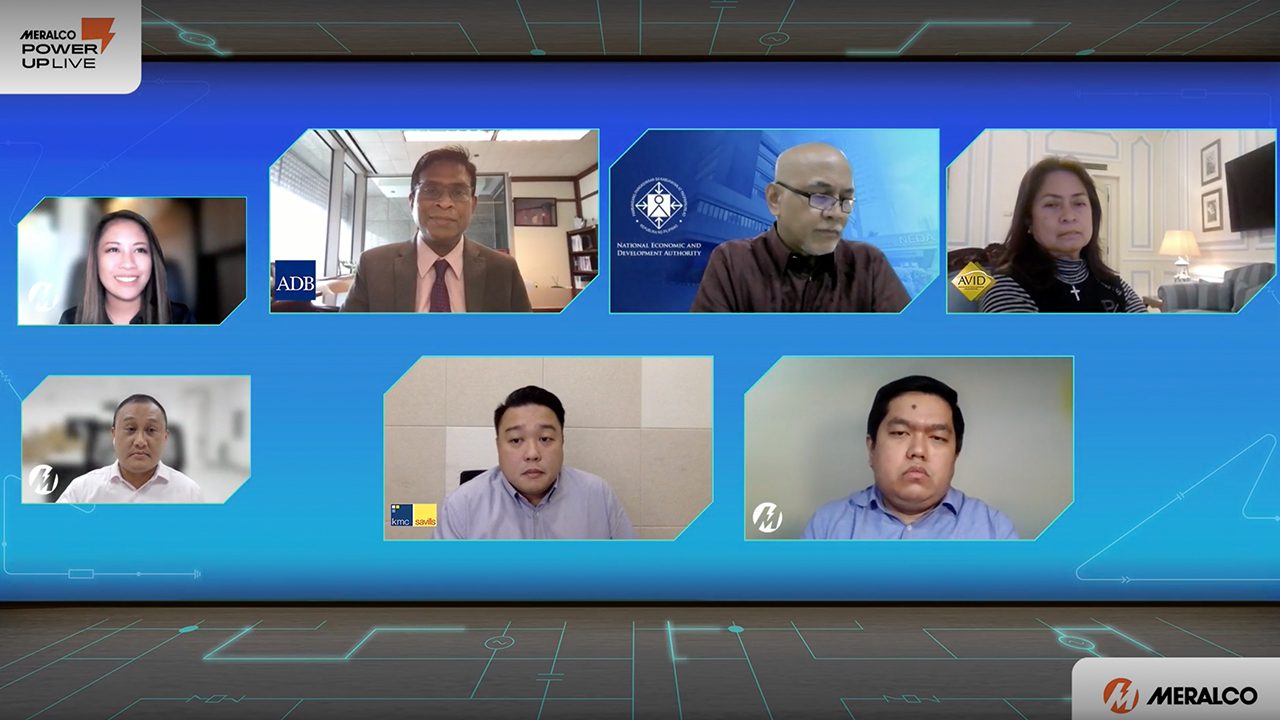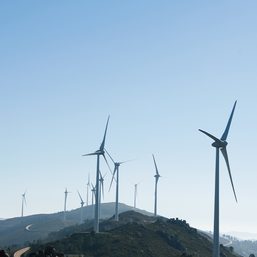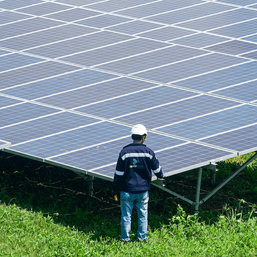SUMMARY
This is AI generated summarization, which may have errors. For context, always refer to the full article.

Editor’s note: This content is sponsored by Meralco and was produced by BrandRap, the sales and marketing arm of Rappler. No member of the news and editorial team participated in the production of this piece.
Energy security and climate change are equally crucial problems that need to be addressed. Businesses, establishments, and households need access to electricity but we also need to protect our planet.
On the flip side of the coin, the local government is also faced with a different kind of challenge – how do we prevent another COVID-19 surge while trying to revive the economy?
In this episode of Meralco Power Up Live, let’s find out how stakeholders are managing these two issues that are on each end of the spectrum.
Hear it straight from esteemed guest speakers from the energy and economic sectors: Asian Development Bank (ADB) chief of energy sector group Dr. Priyantha Wijayatunga and National Economic Development Authority (NEDA) undersecretary Joseph J. Capuno.
ADB’s new energy policy
According to Dr. Wijayatunga, the key energy challenges in Asia and the Pacific remain to be energy access, energy security, and environmental sustainability. About 350 million people have no access to adequate supply of electricity while about 150 million people have no access to it at all. Despite this, the International Energy Agency (IEA) predicts bigger electricity demands by 2040.
This is not good news for the environment and our fight against climate change. About 50% of CO2 emissions come from fossil fuels while about 25% come from coal power generation – our main source of energy.
“The battle against climate change will be won or lost in Asia and the Pacific,” said Dr. Wijayatunga.
To do its part in helping mitigate the climate crisis, ADB has been directing about 50% of its energy sector investments towards clean energy. Going forward, a main focus in its energy sector operations will be decarbonization and phasing out of coal. “We have not been financing coal-fired power stations for the last decade and it is now formalized in the 2021 Energy Policy. We are not providing support for upstream oil and gas projects,” said Dr. Wijayatunga.
Any decisions and investments that ADB will be pursuing moving forward will be guided by what it calls the four Ds: Decarbonization, Decreasing energy intensity, Digitalization, and Decentralization.
The focus will be to shift away from traditional areas of investments and towards new and innovative low carbon technologies and approaches in the energy sector development.

The government’s socioeconomic outlook and plans
NEDA Undersecretary Capuno has reported some positive news about the Philippines’ post-lockdown economy. One of which is that the Philippines gross domestic product (GDP) increased by 7.8% in the first semester of 2022. This growth is driven by the growing demand of consumers and in turn, the need for suppliers to meet this demand.
Undersecretary Capuno also shared that the Philippines’ purchasing manager’s index has increased by 52.9% in September, the fastest in three months. This is still mainly due to the strong consumer demand which boosted factory orders and prompted companies to scale production.
The easing of the lockdowns also increased economic activities including improvements in mobility, return to tourism, and the flow of remittances. All of these are helping uplift the country’s economy. As for the government’s plans moving forward, NEDA shared the Marcos administration’s 8-point socioeconomic agenda:
- Protect purchasing power of families
- Reduce vulnerability and mitigate scarring from the COVID-19 pandemic
- Ensure sound macroeconomic fundamentals and government processes
- Create more jobs
- Create quality jobs
- Create green jobs
- Ensure a level playing field
- Uphold public order and safety, peace and security
The socioeconomic planning body also shared some of the key legislations that will support the Philippines’ economic recovery including National Government Rightsizing Program, Budget Modernization Bill, E-Government Act, and specific to the energy sector is the Amendments to the Electric Power Industry Reform Act or EPIRA (RA 9136), among others.


“This administration’s economic team firmly believes that with the right policies moving forward, we can capably address current and emerging issues and sustain the growth momentum that we have gathered thus far,” according to NEDA.
Meralco Enterprise caters to companies with a demand of at least 500kW. Know more about Meralco Enterprise here. – Rappler.com
Add a comment
How does this make you feel?


![[ROUNDTABLE SERIES] Powering up: Building a bright future with energy security](https://www.rappler.com/tachyon/2024/04/Omnibus-with-guests.jpg?resize=257%2C257&crop_strategy=attention)
![[OPINION] Fossil fuel debts are illegitimate and must be canceled](https://www.rappler.com/tachyon/2024/04/IMHO-fossil-fuel-debt-cancelled-April-16-2024.jpg?resize=257%2C257&crop_strategy=attention)

![[OPINION] What is the ‘endgame’ for BBM’s gas transition?](https://www.rappler.com/tachyon/2024/03/IMHO-Marcos-Endgame-gas-transition-March-19-2024.jpg?resize=257%2C257&crop_strategy=attention)
![[ANALYSIS] A new advocacy in race to financial literacy](https://www.rappler.com/tachyon/2024/04/advocacy-race-financial-literacy-April-19-2024.jpg?resize=257%2C257&crop_strategy=attention)


![[In This Economy] Can the PH become an upper-middle income country within this lifetime?](https://www.rappler.com/tachyon/2024/04/tl-ph-upper-income-country-04052024.jpg?resize=257%2C257&crop=295px%2C0px%2C720px%2C720px)

There are no comments yet. Add your comment to start the conversation.